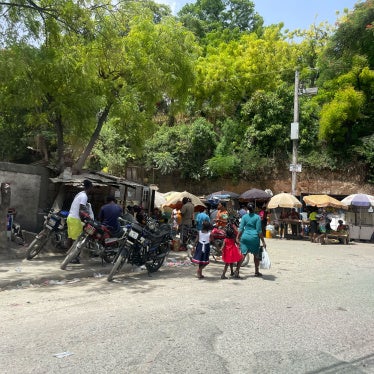Women in the Dominican Republic are routinely subjected to involuntary HIV testing, and those who test positive are fired and denied adequate healthcare, Human Rights Watch said in a report released today.
“In the Dominican Republic, many women suffer double discrimination, both as women and as people living with HIV,” said LaShawn R. Jefferson, executive director of the Women’s Rights Division of Human Rights Watch. “This kind of discrimination only helps to fuel HIV/AIDS. Unless the Dominican government takes measures to address this core problem, it will find it difficult to combat the epidemic.”
The 50-page report, “A Test of Inequality: Discrimination Against Women Living With HIV in the Dominican Republic,” documents the human rights violations women living with HIV suffer in the public health system as well as in the workplace.
Women receive grossly inadequate information about HIV from the public health system, preventing them from giving their informed consent to testing and treatment. Public health professionals routinely reveal HIV test results to women’s families without the tested individuals knowledge or consent, exposing them to violence and abuse. In addition, women living with HIV are frequently denied adequate and equal healthcare.
HIV/AIDS is currently the leading cause of death for women of reproductive age in the Dominican Republic. About 61,000 women are living with HIV or AIDS in the Dominican Republic, constituting a little over half the total population with HIV/AIDS. According to UNAIDS, the proportion of women with HIV/AIDS has grown steadily over the past decade.
One 23-year-old woman reported she was refused even basic childbirth assistance at the public hospital after she had been tested for HIV against her will: “[The doctor] said, ‘I don’t want to be infected.’ When the baby was just about to fall on the floor, he caught him underneath. … They did not clean me or anything. It’s as if you are a dog.”
In the export-processing zone and tourism industry, which are the two main employers of women, employees and job seekers are routinely subjected to mandatory HIV tests. Those who test positive are generally fired or denied employment. This has a particularly negative impact on women, who are more likely than men to know they are HIV-positive, and who already are severely underrepresented in the formal workforce.
A 33-year-old woman reported she was refused a job at a massive hotel complex after she had been tested for HIV in a mandatory part of the job application: “They did the interview, then they sent me to do the analysis. … The next day they tell me that they can’t give me a job because I have HIV. Just like that. They said ‘We can’t give work to someone like that.’ I did not know until then that I had HIV.”
The report recommends that the Dominican government make the protection of women’s rights central to its national HIV/AIDS prevention and treatment plans. Donors—including the Global Fund to Fight AIDS, Tuberculosis and Malaria—should work with the Dominican government to ensure that the country’s HIV/AIDS strategy includes protection of women’s human rights.
A new government will have the opportunity to remedy this situation, as the mid-May presidential elections in the country led to a landslide victory for the leading opposition party. Leonel Fernández Reyna will be inaugurated as president on August 16.
“The incoming president, Leonel Fernández Reyna, must make respect for women’s human rights central to his strategy against HIV/AIDS,” said Jefferson. “The Dominican government should punish companies that require women job seekers to undergo HIV testing, and should ensure that women receive adequate treatment in the healthcare system.”








